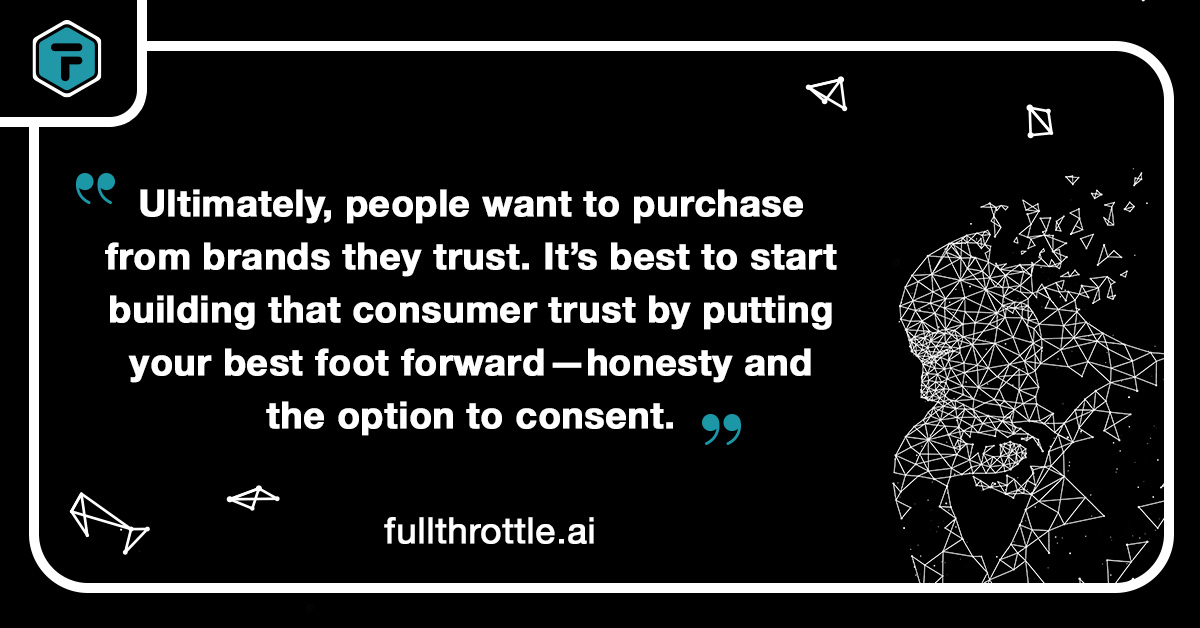
Building Consumer Trust Back
While most would agree that the key to the consumer’s heart is customized and personalized experiences, most would also agree that consumer trust has exited stage left.
On one hand, studies show 75% of consumers want personalized digital experiences. [1] However, on the other hand, 87% of consumers are concerned about how their information is being used. [2]
While they want the benefits of tailored marketing, such as relevant coupons and ads, they don’t want companies running wild with this information.
Right to Privacy
Everyone has a right to privacy and a right to make unbiased, authentic decisions on what is best for them. Some consumers are completely fine with being tracked and targeted or sharing their information in return for something that benefits them. Others would rather maintain an offline presence when surfing the web. The point is that everyone should have a choice. We all have preferences. We are all different.
Traditional advertising has been based on demographics and buying lists as opposed to starting with users who have shown some interest. Sending advertisements to consumers who an advertisement might not be relevant to is a complete waste of budget and doesn’t build their trust.
With new technology, such as fullthrottle.aiTM, starting with in-market audiences who have shown an interest through researching your website is the way to go. Once they’ve opted in, you know their propensity to buy is higher, rather than sticking with the spray and pray method.
Advancement in Technology
The internet and technology have been advancing at such a rapid pace, I believe it has been difficult for the government to keep up and structure legislation as protection. Since it is evolving, the vast majority of the internet can be difficult to fully comprehend, even if you work, live, and breathe in a world of technology.
Being a millennial, I grew up with computers and TV and the internet. However, when I started in the AdTech industry, I had no clue how intricate this space really was.
With all its nuances and procedures, I was completely in the dark on the difference between first-party and third-party cookies. Sure, I had heard of cookies before, yet I had no idea third-party cookies were going away. Having spent my whole life on the computer, the most I knew was that you should delete cookies from your browser often.
How can we govern something we don’t fully understand? Yet, how can we not govern something the average person doesn’t understand?
In order to begin to build that trust back and personalize experiences for the end-user again, we must use opt-in measures in our advertising and data collection.
Ultimately, people want to purchase from brands they trust. It’s best to start building that consumer trust by putting your best foot forward––honesty and the option to consent. Most will consent, if they see the value and how the product or the service suits them.
Technology Ahead of Its Time
At fullthrottle.aiTM, we do not sell the information collected on behalf of our clients. That first-party data is their audience, not ours. Additionally, these are audiences who have already shown some interest in our clients’ products and/or services.
Third-party cookies are being deprecated on Google Chrome, mostly since they must. Privacy legislation will continue to evolve to meet the demands of consumers. Plus, third-party cookies have already been deprecated on most other browsers, such as Safari and Firefox.
Our priority is to help businesses with strategies beyond cookies––which have been invasive and led to a completely justified outrage at how the information collected was being used.
So, not only is fullthrottle.aiTM cookieless, it is also privacy-first through opt-in measures, making it truly future-proof technology. See it for yourself.



